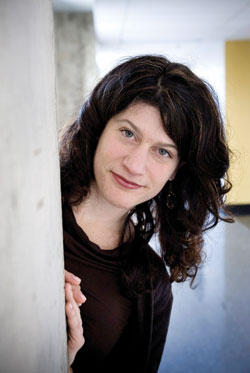Stop running and slow down, psychologist says

Jessey Bernstein is interested in the relationship between autonomy, relatedness and wellbeing. She believes slowing down might help.
Andrew Dobrowolskyj
Jessey Bernstein wants to understand the factors that positively or negatively impact psychological wellbeing. Using the workweek as a model, she determined moments when positive emotions were higher, and the times when negative emotions were.
That people felt more positively on the weekends might not be a huge surprise. That those positive feelings were connected to a greater sense of autonomy and relatedness (connection to others) at times when most people are not at work is significant. As a motivational psychologist using self-determination theory, she knows these factors are psychologically important.
Bernstein continues to try to explain what positively affects our wellbeing. She had been exploring the slow movement on her own as a response to the increased levels of stress associated with the conventional North American lifestyle. She believes that slowing down, which is shown to be connected to less stress, less illness (because of taking sick days) can allow a greater chance for relatedness, and ultimately, a greater sense of self.
The slow movement developed out of the slow food movement over the last two decades. In reaction to fast food, convenience and excess, the slow movement advocates paring down, scaling back and easing up.
She quotes slow food guru Carlo Perlini’s observation that “slowness is choice.” In other words, evaluate what must be done and what you want to be doing. “Because you literally have the time to think about what you want. You are able to act autonomously, with choices you make corresponding to choices that are in tune with your authentic self.”
Bernstein is not against doing something quickly, but she stresses the power of making the choice about how to do something. “There’s this premise we have all of these things we need to do. But we really have to ask why do we have to do all these things?” she said.
Bernstein, currently an LTA in the Psychology Department, recognized the potential benefits of the slow movement while still an over-achieving grad student in Rochester.
“It represented something that I value. So I began to evaluate the ways it was beneficial.” As a self-described “environmentalist” Bernstein recognized that taking the time to get on her bike instead of hopping in the car, had benefits for the planet. “The speed at which we live has a negative impact on the environment.”
Bernstein does not see the movement as blindly reactionary. “I’m not advocating a return to pre-technological times. It’s just that we don’t have to always be rushing around. There are benefits for our health both physical and psychological.”
For instance, buying locally from small stores instead of the convenience of a mall enhances relatedness by getting to know people in your community. And the environment benefits if you walk, or at least drive nearby.
With events like “Take Back Your Time Day,” the grassroots slow movement advocates doing one thing at a time and being present with people instead of always worrying about the next thing. “It can be as simple as sitting and talking to someone face-to-face instead of on a cell phone while you’re doing something else.”
Bernstein questions our society’s premise that we need to always be producing more in order to accumulate more. It’s a philosophy we increasingly instill in our children.
Bernstein would like to explore the motivations for these types of behaviours further through adulthood. “Why are people always running? Is it because they really want to, or do they feel they have to keep up?”